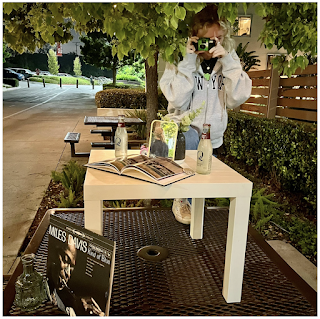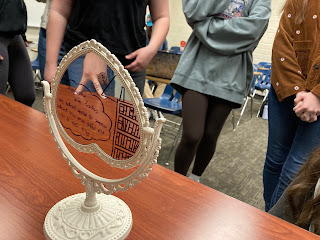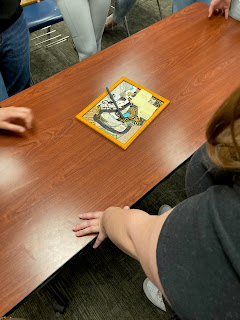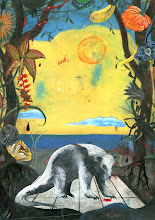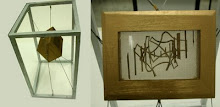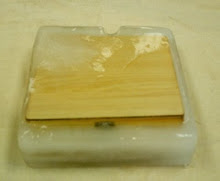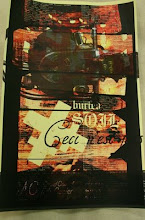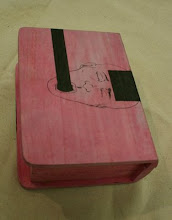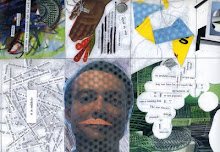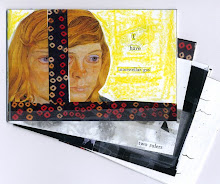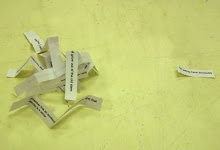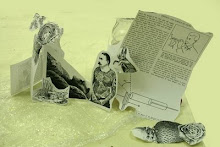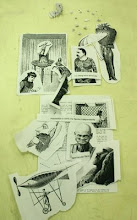VVP: Art 434 & Engl. 410
- Dan Callis and Chris Davidson
- Website for Vision Voice and Practice: An Interdisciplinary Course in Art and Creative Writing
Sunday, May 28, 2023
Provisional Theory of Art and Writing
One of the assignments we've asked students to complete during the past few of iterations of VVP is a "Provisional Theory of Art and/or Writing"—sometimes as a semi-improvised, in-class collaboration; sometimes, as in this term, as a short piece of individually composed prose. We emphasize the importance of the qualification provisional, since the students in VVP are at the beginning of their writing and art-making, and any theory governing one's understanding of creativity should be open to revision. Those stipulations aside, what the students wrote this term was often insightful. Below are some short excerpts.
Emily Adamson: "Sometimes we get so caught up in our own weekly practices and assignments that we forget about the other original ideas constantly flowing around us that can inspire us to write with more passion or structure or humor. The idea that every individual person has the ability to create something that comes from the confines of their mind is exciting and inspires me to put my own work out into the world."
Lexi Anderson: "As someone who wishes to reflect God in my writing, it is interesting how this can be done with a few revisions. My writing is often dry and doesn’t show much love for its characters. My wish is that while reading my stories, audiences fall in love with characters that are meant to be “heroes”, but don’t disregard those that are not."
Ally Brodmann: "Scribble down a few words. Stare at the page for a few moments. Scratch it out with the tip of your black pens. Rewrite the sentence, changing a couple words that sounded funky at the start. Writing can be extremely hard, and it doesn’t come naturally. Rarely do we see a writer publish their first draft of something (or maybe there are first drafts of writing published, but we never see them buried under the perfected pieces). It is a constant effort of thinking, writing, rewriting, and rewriting some more. But it is always an exhilarating feeling to look at a swoon-y sentence and know the hard work that was put into making it that good."
Evan Dickerson: "I felt that [the weekly writing] restrictions [we were asked to keep for VVP] were a good starting point; especially the time restraint because it keeps me from overthinking. I have seen my writing become less abstract while still being able to convert things like love and music, which technically is concrete but because we hear it and don’t see it, it’s difficult to write about. What I’ve been doing is just thinking of examples of love or music or things that are associated with those things, like holding hands or being at a jazz club. What do those things feel like, who is there, what’s the environment like? Those are the questions I try to answer while I write."
Hannah Fodera: "This is why I write: to both preserve and illuminate the humanity I experience. I write as an act of gratitude and worship, but also of pleading and wrestling. I hope when I write and present to others the trinkets I’ve collected, they might start collecting their own. Or, at least, that they may notice the world around them— this beautiful, bittersweet world. That they may feel the honor it is to be human. That they may revel in life’s simplicity, to stammer at its transcendence."
Madeline Gruenler: "As it turns out, writing—and art more broadly—is a worthwhile occupation to people whose chief end is to glorify and enjoy God. Done well, writing is a way to reflect back to God his creative and loving nature. People express the image of God in them simply by making. Through writing they can be charitable and empathetic toward others, as well as appreciative of the beauty and meaning in God’s creation."
Ivy Guo: "As an English major with a writing concentration, studying Marianne Moore and Joseph Cornell’s works has encouraged and motivated me. Although I might not choose visual art as my career in the future, learning about the literariness in artworks is still helpful for me to think about the theme in my writing. Although mortal and fragile, love strengthens us to protect what we find meaningful and valuable. As a writer, I would like to keep expressing my fragility in writing to show my love for literature and how it has made me strong and brave enough to do so."
Aspen Haw: "At the end of the day, my purpose in writing is greatly informed by Proverbs 21:31: 'The horse is made ready for battle, but victory rests with the Lord.' My writing is the horse which I equip with the life experiences God has seen me through. Hopefully it will one day get people thinking civilly about the shortcomings in society, encourage people to hurry to slow down before the little things pass them by, and tell the minoritized that they are seen."
India Long: "By reading various poems and books, I feel encouraged to evoke the same feelings...in my own writing. Through the writing workshop we’ve done in this class, I’ve been able to practice another form of poetry while also sharing pieces of my life with others and building new connections through writing. I hope that my observations of the world help readers, classmates, and friends feel more known. Conversely, I feel more known by having those observations read, which in turn gives me a renewed sense of life and joy."
Chris Matthews: "In Genesis 11:4, the people decided to make a name for themselves, specifically saying, 'let us make.' But in Genesis 12:2-4, in direct contradiction to what they did at the tower of Babel, the Lord said, 'I will make.' God's plans are in play, but what an exciting contrast of language being a dividing line, a punishment for attempting to make ourselves more than God. ... I don't believe I can grasp the depths of God's involvement in our hearts and minds through language, Spirit, word, and truth, nor do I think I have the physical capacity to do so. But, there is beauty in this difficult yet pleasant task of writing because it allows me to discover more of myself and, therefore, more of the God who created me."
Joy Nowak: "to find the one we write for so we can ask what exactly love has to do with it"; "I know a liberating restriction keeps me writing"; "I can copy...someone else's words to apprentice under..."
Emily Seeba: "This project made me think about my own writing and how I hope to convey similar emotions to my own readers. I hope to make an impact on people through my work and to honor God with my talents and creations. Finally, I want people to review my work and pay careful attention to the details I include, just as I pay attention to how detailed and beautiful God’s creation truly is. "
Elena Stiff: "I fear writing because I fear being unauthentic. Before I place my hands on the keys, I question my intentions. I interrogate my intention behind writing like someone would interrogate their emotion to find its truth. It’s a process that should be honored and taken heavily. We have been given the gift of speech, the gift of thought and the gift of fabrication of those two things. Writing helps me discover that I am not the only thing to exist."
Leticia Torres: "Writing gives the gift of a reprieve from the busyness of life and the whirlwind of thoughts so that I can bask in life’s little blessings. As I sit in the space writing creates, I am better able to understand what motivates me, what I take pleasure in, and what I take for granted."
Grace Ulibarri: "Since writing has become a way for me to better understand the world and the people around me, I feel as though I cannot do anything else. To give up writing would be to give up life. What I mean when I say that 'writing is life' is that writing is the medium in which I can work towards my goal as a human being. My days are numbered, but I strive to make those days count toward something larger than myself. If I live my life continually striving to observe more, listen better, and love stronger, then my life has not been wasted."
Trinity Van Gaasbeek: "I often find that my writing takes over—my best pieces are made when I relinquish my power. Writing becomes its own being—life breathed onto this page. It writes itself, and I become a conduit or puppet. Why does Writing take over my body? I find this to happen when I find connections between the things I am writing about. Writing becomes not pure creation, but instead an act of observation. I approach my writing like I approach reading literature (loosely)."
Jonah Williams: "I do not agree that beginning a sentence with and or so should be criticized. If my reader can clearly understand what I am writing about then I have succeeded. I create a hospitable environment for my reader and allow them to coast down my stream of consciousness. My writing is not puzzling, philosophical, or littered with quotes that are embedded or married to two commentaries. My hope is that this writing is ... 'hospitable to my reader,' and therefore I have succeeded in my purpose as a writer."
Cross-Genre Conversation Piece #2
This was an extra credit assignment, and only a few students did it. Like the second extended collaboration (see below), this assignment asked students to make something that interacts directly with one or both of our second artist/writer pair—Kerry James Marshall and George Saunders.
~
Ally Brodmann:
~~~
Extended Collaboration #2—April 25, 2023
For this second Extended Collaboration, the students were invited to make work under the influence of our second artist/writer pair, painter Kerry James Marshall and author George Saunders.
~
Ally Brodmann, India Long, Trinity Van Gaasbeek:
~~~
Friday, March 17, 2023
Extended Collaboration, March 16 2023
After enjoying a taco dinner prepared by our wonderful colleague and art professor Jon Puls, our students shared the art-text collaborations they've been working on the past few weeks. The results follow. Click on the images for better views.
~
Emily Seeba, Ella Buell, India Long:
~~~~~~






